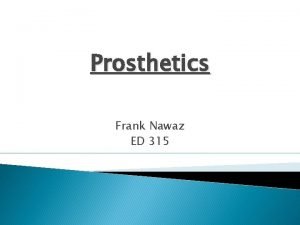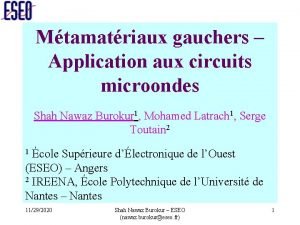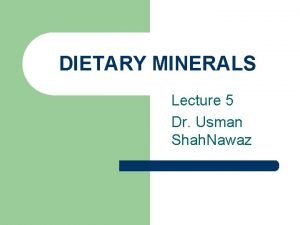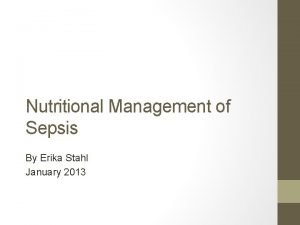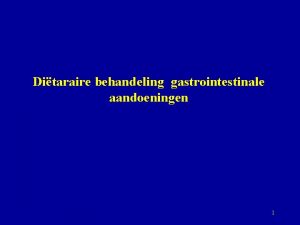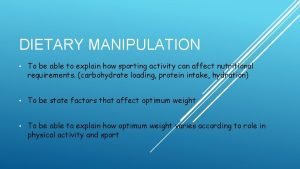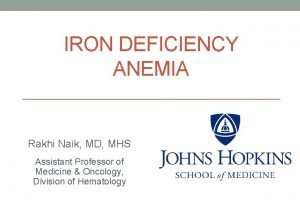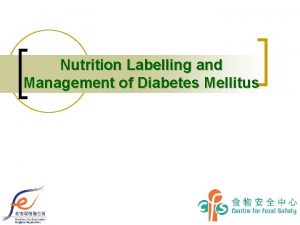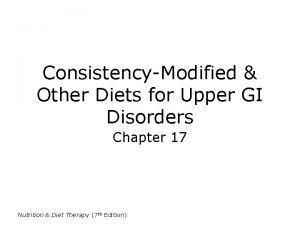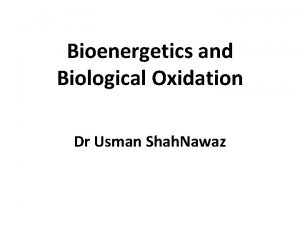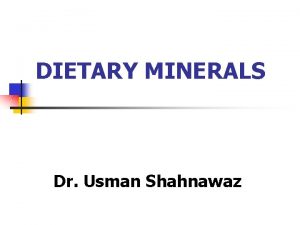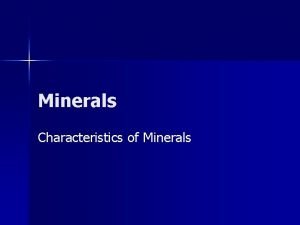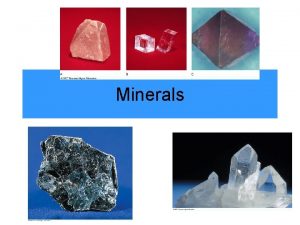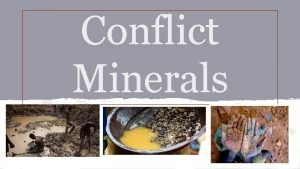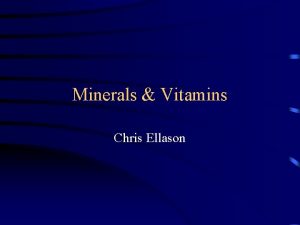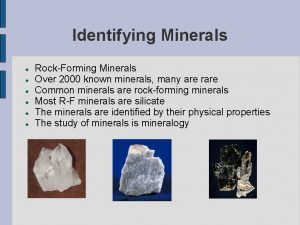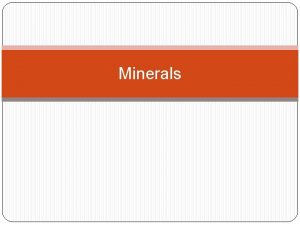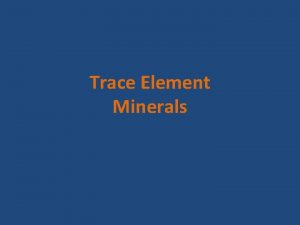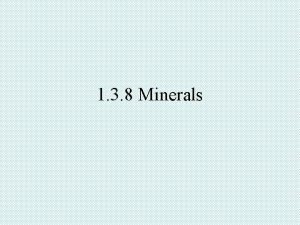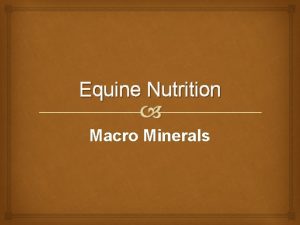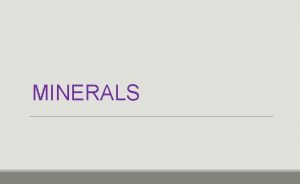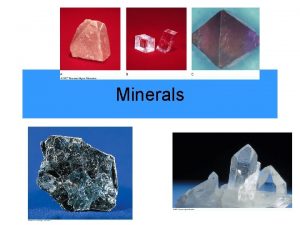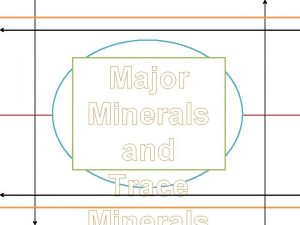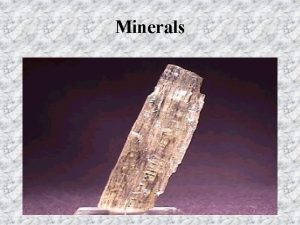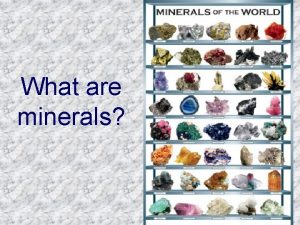DIETARY MINERALS Lecture 5 Dr Usman Shah Nawaz



















- Slides: 19

DIETARY MINERALS Lecture 5 Dr. Usman Shah. Nawaz

Copper ( Cu ) l – – – – Dietary sources Oyster Nuts Legumes Mushrooms Meat Dry fruit Potatoes

Absorption, Metabolism, & Regulation of Copper Absorbed in small intestine & stomach as free and bound Cu l Amino acids bound Cu is also absorbable l Influenced by Cu status – Body stores and requirement – Form : Cupric or Cuprous l Excess incorporated into bile & eliminated in feces l

Absorption, Metabolism, & Regulation of Copper l l Bioavailability decreases with – Antacids – Iron – Ca – Zn Total Cu level 100— 150 mg – Muscle 64 mg – Bone 23 mg – Liver 18 mg

Transport of Cu l l Ceruloplasmin 96 % Remaining with albumin and globulin l – – Functions of ceruloplasmin Cu transport Conversion of iron from ferrous to ferric form

Functions of Copper l l l – l Needed to absorb and utilize iron Part of anti oxidant enzyme superoxidase dimutase ATP synthesis Cytochrome C oxidase Connective tissue synthesis

Excretion l l l Unabsorbed in feces Bile Sweat Urine Menstrual blood

Copper Deficiency & Toxicity l l l Deficiency – �� Hospitalized patients & preterm infants – �� Antacids Signs & Symptoms – �� Defective connective tissue, anemia, neural problems �� Toxicity – �� Rare

Copper Deficiency l Menke’s Disease – X-linked recessive genetic disorder – Poor copper absorption – Steely hair syndrome – Growth retardation

Copper Deficiency l Wilson’s disease – – – – Autosomal recessive disorder Increased Cu absorption Liver Cu level increases Excessive urinary excretion of Cu Serum Cu level decreases Cu accumulates in liver , brain and kidney CNS lesions with muscular incoordination

Iodine

Iodine l l l Essential for the formation of thyroid hormones Total iodine content 20— 40 mg ( 20 % in thyroid gland) Plasma iodide level 0. 3— 0. 5 micro gm/ dl Daily intake 500 micro gm Almost all absorbed Remaining excreted in urine

Dietary Sources Seafood l Milk/dairy products l Iodized salt l Cod liver oil l

Absorption, Metabolism, &Regulation of Iodine Absorbed in small intestine & stomach l Also absorbed in lungs, mucous membrane and skin l Taken up by thyroid gland l Thyroid-stimulating hormone regulates uptake l


Functions of Iodine l – – l l – – Component of: �� Thyroxine (T 4) �� Triiodothyronine (T 3) Regulates energy metabolism, growth, development Signs of deficiency �� Severe fatigue �� Lethargy

Iodine Deficiency l Goiter (less severe) – �� Enlarged thyroid gland due to body’s attempt to increase thyroid hormone production

Iodine Deficiency l – – Cretinism (severe) �� Severe iodine deficiency during pregnancy, serious problems in baby �� Stunted growth, deaf, mute, mentally retarded

Iodine Toxicity l �� Hypothyroidism �� Hyperthyroidism ( Thyrotoxicosis ) l �� Formation of goiters l
 Usman nawaz missing
Usman nawaz missing Shah nawaz burokur
Shah nawaz burokur Iodine functions
Iodine functions Muhammad nawaz shareef university of agriculture
Muhammad nawaz shareef university of agriculture 01:640:244 lecture notes - lecture 15: plat, idah, farad
01:640:244 lecture notes - lecture 15: plat, idah, farad Vitamin k dietary sources
Vitamin k dietary sources Sepsis dietary management
Sepsis dietary management Dietary supplement meaning
Dietary supplement meaning Dietary indiscretion
Dietary indiscretion Dietary manipulation in sport definition
Dietary manipulation in sport definition What is dharma
What is dharma Scottish dietary goals 2020
Scottish dietary goals 2020 The food exchange system
The food exchange system Breakfast for a sedentary worker
Breakfast for a sedentary worker Dietary acculturation
Dietary acculturation Low ferritin symptoms
Low ferritin symptoms Dietary management of diabetes
Dietary management of diabetes Mechanically altered diet
Mechanically altered diet Dietary supplement questionnaire
Dietary supplement questionnaire Mealracker
Mealracker
